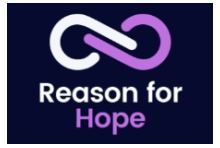Reason for Hope’s leadership team, policy advisors, and advocates are primarily connected by the loss of loved ones to suicide or substance use. The organization was named in memory of Brett’s mom, Sherrie Hope Waters, who died by suicide in 2018.
Over the last year, our team of volunteers devoted countless hours to drafting and advancing legislation, preparing policy proposals, and educating legislators and government officials in Connecticut, Pennsylvania, New York, Congress, ... Read More
Reason for Hope’s leadership team, policy advisors, and advocates are primarily connected by the loss of loved ones to suicide or substance use. The organization was named in memory of Brett’s mom, Sherrie Hope Waters, who died by suicide in 2018.
Over the last year, our team of volunteers devoted countless hours to drafting and advancing legislation, preparing policy proposals, and educating legislators and government officials in Connecticut, Pennsylvania, New York, Congress, and the Biden Administration on issues related to psychedelic medicine and assisted therapies.
Why?
Because we are experiencing an unprecedented level of chronic stress, trauma, and shared desperation, creating a unique urgency for bold but thoughtful measures to change the status quo of mental health care. And a growing body of evidence - including historical indigenous use, a rapidly increasing number of powerful anecdotes, and research from formal clinical studies - suggests that a variety of psychedelics will prove safer and more effective than current treatments for preventing future deaths of despair. Further, these powerful tools demonstrate a unique ability to restore a sense of purpose and connection, providing a foundation for those suffering to move forward with meaningful lives.
However, we know that with great power comes great responsibility, and there is a history of unlicensed facilitators who have abused this power in both underground and above ground settings, without accountability. We must therefore work diligently to establish ethical, safety, and professional protocols, and systems for reporting, accountability, and discipline. And we must be flexible to update these protocols as we continue learning to optimize the safety, efficacy, and affordability of these tools to maximize the individual and public health benefits.
We recognize that this treatment will not work or be appropriate for everyone, and that after 50+ years of prohibition, we still have much to learn about for who, when, and how best to use this form of treatment. And of course, we recognize that there is no such thing as a “cure” or “magic bullet” when it comes to mental health. Yet, we also recognize that psychedelic-assisted therapy has not only saved, but reinvigorated the lives of many people at risk of suicide or overdose, who are motivated to now help others find similar healing. These are the driving forces motivating Reason for Hope’s work, because while it may be too late for those we have lost, it is not too late for many others currently struggling, for whom psychedelic-assisted therapy provides a reason for hope.
Hide Full Text